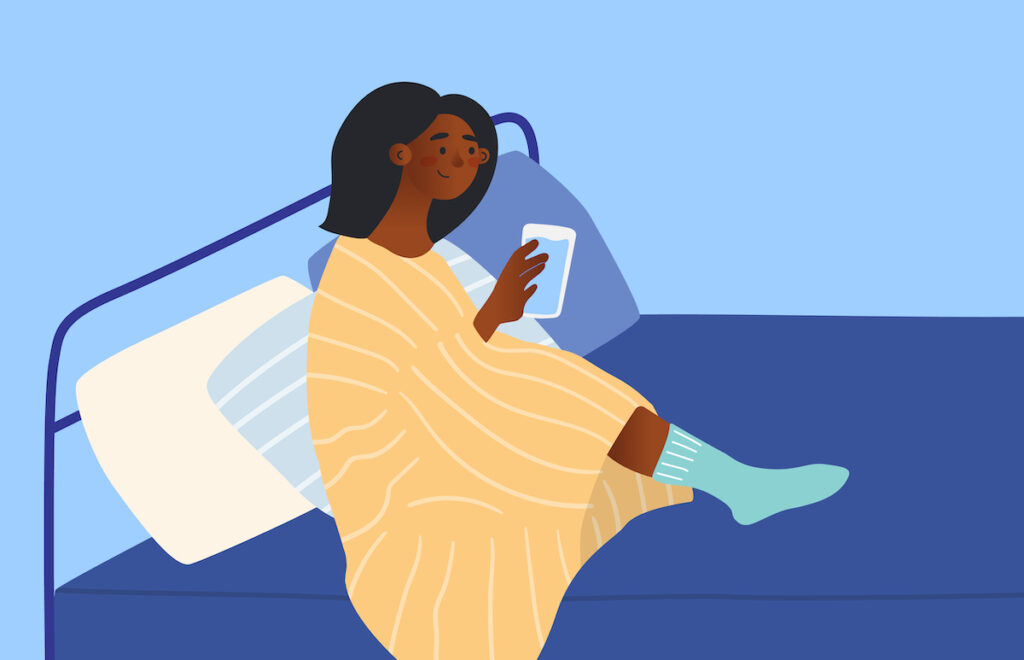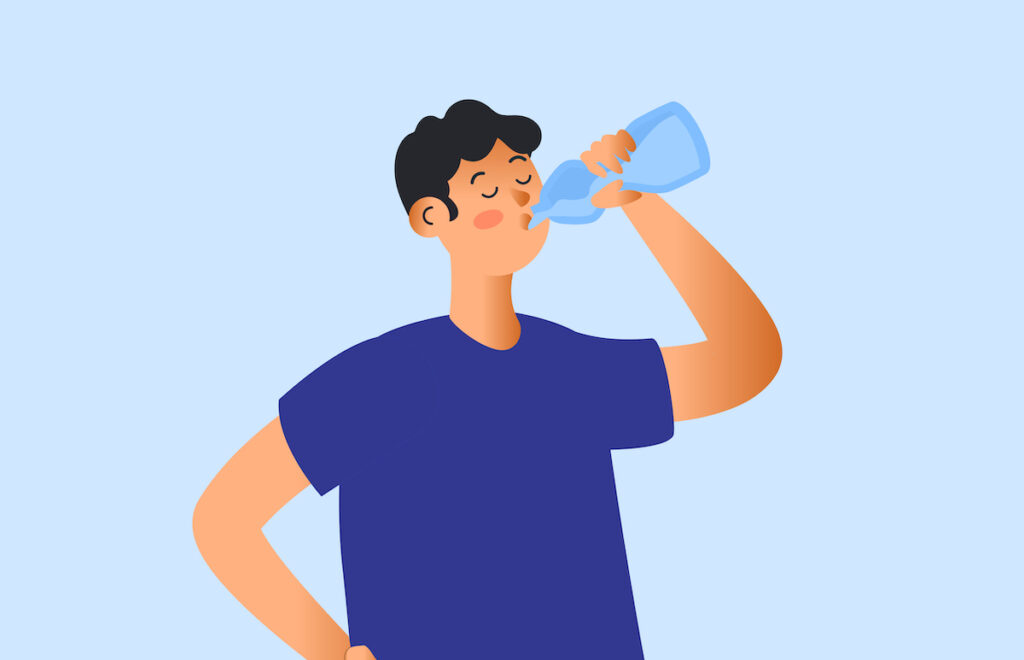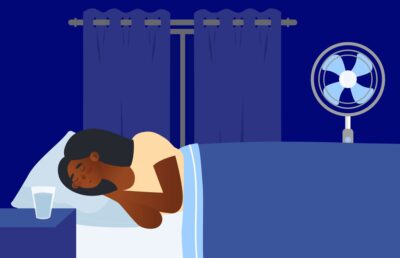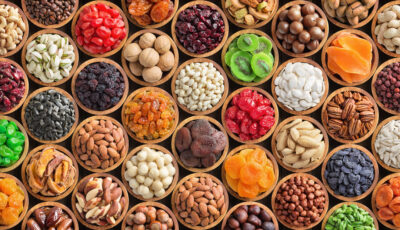The Complete Guide to Hydration and Sleep
- by Abby McCoy
- Updated: April 5, 2024
Table of Contents

Have you ever woken up in the middle of the night with a cotton-dry mouth and in desperate need of a sip of water? To try to prevent this, you might have tried to guzzle liquids before bed, only to be roused that night by a demanding bladder. Hydration and sleep require a good balance. When you hit that harmony just right, your chances for an excellent, uninterrupted slumber get better and better.
Long Story Short
- Wondering how hydration affects sleep? Dehydration can wake you up with a sore throat, dry mouth, and muscle cramps. But if you stay hydrated, you’re more likely to sleep better.
- Because you lose water naturally while you breathe and sleep, you may wake up feeling dehydrated.
- You can avoid sleep dehydration by drinking plenty of fluids throughout the day, eating foods with a high water content, and keeping your bedroom cool to minimize sweating while you sleep.
- The best drinks for hydration are plain water, fruit-infused water, and, when needed, sports drinks with electrolytes.
The Relationship Between Hydration and Sleep
“Sleep and hydration are interconnected and can influence one another,” Jordan Hill, a registered dietitian, tells Sleepopolis. “Proper hydration is essential for maintaining good sleep quality.” Hill says when your body gets dehydrated, you can experience uncomfortable symptoms that can disturb sleep. Dehydration symptoms include:
- Dry mouth
- Excessive thirst
- Headaches
- Muscle cramping
- Scratchy throat
- Sinus congestion
Poor sleep can also lead to poor hydration, Hill explains. “When sleep deprived, hormone regulation can be altered, which can have a negative impact on fluid balance in the body. Being sleep deprived can also impair the ability to recognize thirst sensations accurately, leading to inadequate fluid intake.”
On the flip side, when you go to bed hydrated, you sleep better, Hill says. If you take away all the disrupting effects of dehydration laid out above, your sleep quality can only improve.
Why You Wake Up Feeling Dehydrated
You lose water while you sleep through your breath and sweat, a phenomenon called insensible fluid loss. This goes on 24 hours a day. But while you snooze, you can’t take sips from your water bottle or cup of tea like you may do during the day, so dehydration can creep in.
General Risk Factors for Dehydration
You may be at a higher risk for dehydration depending on some health factors:
- Age: Both young children and older adults can become dehydrated more easily. Children have a faster metabolism, they can’t easily communicate their thirst, and have more insensible fluid loss. Older adults tend to have a lower appetite and thirst, and they’re more likely to take medications that promote fluid loss.
- Diuretic medications: These medications help your body get rid of extra fluid, which takes some strain off your heart. However, balancing the fluid out and fluid in can get tricky, and sometimes diuretics can cause dehydration.
- Infection: Fevers can cause excessive sweating, leading to fluid loss and dehydration. A severe infection like sepsis can do the same, but faster.
- Stomach illness: If you experience prolonged vomiting and diarrhea, these symptoms can quickly lead to dehydration, especially in children.
- Chronic illness: A handful of long-term illnesses can cause fluid loss. The blood sugar spikes in diabetes can make your body get rid of fluid double-time. In another example, during an Addison’s disease crisis event, hormone imbalance can lead to severe dehydration.
- Low estrogen levels/Menopause: Estrogen and water love each other. When estrogen decreases during menopause, water may not want to hang around as much, and you can experience dehydration more easily.
Lifestyle Factors
Illness and aging aren’t the only factors that can play a part in dehydration and sleep.
- Snoring or mouth-breathing: Breathing through your mouth can increase insensible water losses.
- Room temperature: A sleeping environment that is too warm can cause lots of sweating, which isn’t great for nighttime hydration.
- Nighttime exercise: If you exercise too close to bedtime, you might not have the chance to replenish your fluid before you fall asleep.
- Alcohol consumption: Consuming alcohol before bed makes you urinate more and can easily worsen dehydration during sleep — and that’s not even taking hangovers into consideration.
Avoiding Dehydration During Sleep

You may wonder how to hydrate overnight, seeing as you’re asleep. You can improve your nighttime hydration by adopting some new habits, says Hill, who recommends the following tips:
- Keep your bedroom cool and well-ventilated so that excessive heat won’t cause increased fluid loss through sweating.
- Limit alcohol intake.
- Maintain a moist bedroom with a humidifier if you live in a dry environment.
- Put a glass or bottle of water next to your bed as a hydration reminder.
- Stay hydrated throughout the day by sipping water regularly, especially in hot weather or during exercise.
- Use breathable bedding and moisture-wicking pajamas to help regulate body temperature.
Hydrating Foods
You can also get more water through the food you eat. According to Hill, these options can give you the most hydration:
- Cabbage
- Cantaloupe
- Celery
- Cooked squash
- Lettuce
- Spinach
- Strawberries
- Watermelon
If you stay hydrated all day, you’ll be a lot less likely to lose too much fluid while you sleep.
The Most Hydrating Drinks, Ranked
Hydration from fluids with or without electrolytes both have important uses because different situations call for different fluids, Hill explains.
Fluids Only
Hill ranks fluids in the following order from maximum hydration to least:
- Water
- Fruit-infused water
- Smoothies with a water base
- Nut milks, such as those made from almonds or cashews
- 100 percent fruit juices
- Teas
Fluids with Electrolytes
All the drinks above provide hydration, but drinks with electrolytes also provide minerals like potassium, calcium, and magnesium that may need to be replenished in certain situations. Electrolytes help your heart pump, your muscles work, and your brain send messages. They also clean out your cells and shoo out waste products through your kidneys. Hill ranks these electrolyte-laden beverages for hydration value in this order:
- Sports drinks and electrolyte drinks (contains added forms of electrolytes, usually in higher concentrations than the natural forms)
- Broths, white or chocolate cow’s milk, and coconut water (contains natural forms of electrolytes)
- Smoothies with coconut water or milk base
Sports drinks claim to boost energy, replace electrolytes, prevent dehydration, improve physical performance, and lessen fatigue. For athletes who need a lot of fluid replacement, experts suggest that hydration with electrolytes may be the way to go. But for those not involved in intense physical activity, the high sugar content in sports drinks can outweigh any benefit.
How to Avoid Frequent Urination at Night
In the process of avoiding dehydration, you can overhydrate and find yourself running to the bathroom all night. “To minimize nighttime urination and sleep disruptions, it’s generally recommended to limit fluid intake in the evening, especially in the hours leading up to bedtime,” Hill says. “However, individual fluid needs and tolerance can vary.”
You can try gradually drinking less leading up to bedtime to find out how much is too much for you. Some other tips include:
- Keep your legs elevated during sleep.
- Limit alcohol and caffeine at night.
- Stay away from white noise that has running water sounds.
- Use the bathroom right before bed.
When to Talk to a Doctor
Fortunately, many dehydration risk factors have workarounds and preventive tactics. If you’re concerned you may be at high risk for dehydration from a health condition, let your healthcare provider know, and they can help you come up with a plan.
Changing these habits can help you stay hydrated all night. If you think your snoring may be connected to a condition like sleep apnea, let your provider know. Some sleep problems can’t be solved by lifestyle changes alone, and your provider can help you get the treatment you need.
FAQs
Does drinking water keep you awake at night?
Drinking water too close to bedtime can keep you running to the bathroom all night. Try to slow down on the fluid intake as bedtime gets closer.
Can dehydration cause sleeplessness?
Dehydration can cause sleeplessness by causing uncomfortable symptoms that wake you throughout the night, like dry mouth, muscle cramps, and a scratchy throat.
Does drinking water help you sleep?
Yes! By drinking enough water throughout the day, you can avoid uncomfortable dehydration symptoms and sleep better.
The Last Word From Sleepopolis
Sleep and hydration are closely intertwined. If you keep yourself hydrated throughout the day, your sleep quality will improve. Drink plenty of fluids from morning till evening, eat foods with a high water content, and keep your bedroom cool. If you start waking up to urinate more than usual, you can adjust your hydration timing and get back to uninterrupted sleep. Good hydration and better sleep are within reach.
Sources
- Dehydration: MedlinePlus. MedlinePlus – Health Information from the National Library of Medicine. Accessed June 7, 2024. https://medlineplus.gov/dehydration.html
- DeBeer AD. Stop cramping your style: treatment options for muscle spasms. The South African General Practitioner. Published online August 12, 2022.
- McNeil-Masuka J. Insensible Fluid Loss – StatPearls – NCBI Bookshelf. National Center for Biotechnology Information. Accessed June 7, 2024. https://www.ncbi.nlm.nih.gov/books/NBK544219/
- Taylor K. Adult Dehydration – StatPearls – NCBI Bookshelf. National Center for Biotechnology Information. Accessed June 7, 2024. https://www.ncbi.nlm.nih.gov/books/NBK555956/
- Vega RM. Pediatric Dehydration – StatPearls – NCBI Bookshelf. National Center for Biotechnology Information. Accessed June 7, 2024. https://www.ncbi.nlm.nih.gov/books/NBK436022/
- Mentes JC, DeVost MA, Nandy K. Salivary Osmolality, Function, and Hydration Habits in Community-Dwelling Older Adults. SAGE Open Nursing. Published online January 2019:237796081982625. doi:10.1177/2377960819826253
- Puga A, Lopez-Oliva S, Trives C, Partearroyo T, Varela-Moreiras G. Effects of Drugs and Excipients on Hydration Status. Nutrients. 2019;(3):669. doi:10.3390/nu11030669
- Dehydration – Illnesses & conditions | NHS inform. Scottish health information you can trust | NHS inform. Accessed June 7, 2024. https://www.nhsinform.scot/illnesses-and-conditions/nutritional/dehydration
- Managing Diabetes in the Heat | Diabetes | CDC. Centers for Disease Control and Prevention. Published July 27, 2022. Accessed June 7, 2024. https://www.cdc.gov/diabetes/library/features/manage-diabetes-heat.html
- Tingskov SJ, Mutsaers HAM, Nørregaard R. Estrogen regulates aquaporin-2 expression in the kidney. In: Vitamins and Hormones. Elsevier; 2020:243-264. http://dx.doi.org/10.1016/bs.vh.2019.08.016
- Yi-Fong Su V, Chou K-T, Tseng C-H, et al. Mouth opening/breathing is common in sleep apnea and linked to more nocturnal water loss. Biomedical Journal. 2024;(3):100536. doi:10.1016/j.bj.2022.05.001
- Armstrong LE. Rehydration during Endurance Exercise: Challenges, Research, Options, Methods. Nutrients. 2021;(3):887. doi:10.3390/nu13030887
- Hangovers | National Institute on Alcohol Abuse and Alcoholism (NIAAA). National Institute on Alcohol Abuse and Alcoholism (NIAAA) | National Institute on Alcohol Abuse and Alcoholism (NIAAA). Accessed June 7, 2024. https://www.niaaa.nih.gov/publications/brochures-and-fact-sheets/hangovers#
- Water and Healthier Drinks | Healthy Weight, Nutrition, and Physical Activity | CDC. Centers for Disease Control and Prevention. Published June 6, 2022. Accessed June 7, 2024. https://www.cdc.gov/healthyweight/healthy_eating/water-and-healthier-drinks.html
- How Much Water Do You Need? eatright.org – Academy of Nutrition and Dietetics. Accessed June 7, 2024. https://www.eatright.org/health/essential-nutrients/water/how-much-water-do-you-need#
- Water in diet: MedlinePlus Medical Encyclopedia. MedlinePlus – Health Information from the National Library of Medicine. Accessed June 7, 2024. https://medlineplus.gov/ency/article/002471.htm
- Nolan, L. (2020, June 15). How to prevent and treat muscle cramps. Ohio State Medical Center. https://wexnermedical.osu.edu/blog/how-to-prevent-and-treat-muscle-cramps
- Hydrate Right. eatright.org – Academy of Nutrition and Dietetics. Accessed June 7, 2024. https://www.eatright.org/fitness/physical-activity/exercise-nutrition/hydrate-right
- Urinating more at night: MedlinePlus Medical Encyclopedia. MedlinePlus – Health Information from the National Library of Medicine. Accessed June 7, 2024. https://medlineplus.gov/ency/article/003141.htm
- Rodak K, Kokot I, Kratz EM. Caffeine as a Factor Influencing the Functioning of the Human Body—Friend or Foe? Nutrients. 2021;(9):3088. doi:10.3390/nu13093088
- Nocturia: Symptoms, Diagnosis & Treatment – Urology Care Foundation. Home – Urology Care Foundation. Accessed June 13, 2024. https://www.urologyhealth.org/urology-a-z/n/nocturia
- Simulescu V, Ilia G, Macarie L, Merghes P. Sport and energy drinks consumption before, during and after training. Science & Sports. 2019;(1):3-9. doi:10.1016/j.scispo.2018.10.002
- Malik VS, Li Y, Pan A, et al. Long-Term Consumption of Sugar-Sweetened and Artificially Sweetened Beverages and Risk of Mortality in US Adults. Circulation. 2019;(18):2113-2125. doi:10.1161/circulationaha.118.037401
- Adrenal Insufficiency & Addison’s Disease – NIDDK. National Institute of Diabetes and Digestive and Kidney Diseases. Accessed June 12, 2024. https://www.niddk.nih.gov/health-information/endocrine-diseases/adrenal-insufficiency-addisons-disease
- Bichet DG. Vasopressin and the Regulation of Thirst. Annals of Nutrition and Metabolism. 2018;(Suppl. 2):3-7. doi:10.1159/000488233
- Rosinger AY, Chang A-M, Buxton OM, Li J, Wu S, Gao X. Short sleep duration is associated with inadequate hydration: cross-cultural evidence from US and Chinese adults. Sleep. 2018;(2). doi:10.1093/sleep/zsy210
- Fluid and Electrolyte Balance: MedlinePlus. MedlinePlus – Health Information from the National Library of Medicine. Accessed June 13, 2024. https://medlineplus.gov/fluidandelectrolytebalance.html#
- Hill, Jordan, RD. Personal Interview. June 8, 2024.
Subscribe Today!
Get the latest deals, discounts, reviews, and giveaways!



